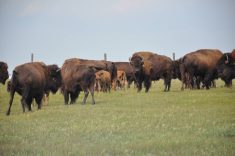VICTORIA – Opponents of a new slaughterhouse waste composting facility in British Columbia’s interior says the operation, which takes only non-specified risk material, threatens the environment and residents.
In mid-January, the Mitchell family, owners of Spa Hills Farm, opened the compost operation between Falkland and Salmon Arm.
The facility will accept 1,300 tonnes of non-specified risk material a year.
Under a five-year contract, Spa Hills will charge Riverside Meats in Salmon Arm, Kam Lake View Meats in Kamloops and Valley Wide Meats in Enderby eight cents per pound to dispose of their waste, with free pickup, said Jake Mitchell.
Read Also

Canadian Food Inspection Agency extends chronic wasting disease control program consultation deadline
Date extended for consultation period of changes to CWD program
John Ressman, who has lived for 21 years on a 10-acre property near the 140-acre Spa Hills Farm, said a facility that makes compost out of slaughterhouse waste should operate in an isolated area.
“We object to where the facility is located. It’s in a semi-residential area. Why put it in somebody’s backyard? There’s lots of crown land available,” Ressman said. “We are the guinea pigs, sitting here.”
Composting takes place inside a large, concrete-floored building that sits in the centre of the 140 acre property, Mitchell said.
Six aeration bins, each one with time and temperature monitoring systems, operate aerobically, which means available oxygen produces a faster, less smelly breakdown than anaerobic composting.
Slaughterhouse waste is put into a bin and blended with straw, wood waste and chicken manure from the Mitchells’ farm.
This mixture sits in a bin for four weeks and then transferred to another bin for two weeks.
The final product is what’s called Class A compost, which Spa Hills, also a 50,000-bird broiler operation, will use as a chemical-free fertilizer on its grain fields.
Ressman doubts that safe compost can be created in six weeks.
“It’s totally unfounded,” he said. “The system being used is completely unproved in B.C. and Canada.”
Karen Dittloff, who lives an hour from the farm in Grindrod, also wonders if Class A compost can be made in 42 days. Her community once kept a slaughterhouse waste facility out of its borders.
Mitchell said Spa Hills hired a professional agrologist to design the facility and assist with startup and regulatory requirements. He said he is convinced the compost will be ready in six weeks.
Dittloff would still like the environment ministry to test the samples for E. coli, salmonella and other pathogens that could end up in the water supply. Of particular concern are prions, a protein particle that is believed to be the cause of brain diseases such as BSE, scrapie and Creutzfeldt–Jakob disease.
Prions are not visible microscopically, contain no nucleic acid and are highly resistant to destruction.
Spa Hills is located above the Salmon River, which empties into Shuswap Lake. Ressman said this is causing concern that water, including wells, could be harmed.
“There are deep wells that are susceptible to ground water contamination,” he said.
Dittloff is also concerned that slaughterhouses could send SRMs to Spa Hills by accident.
Mitchell said SRMs are dyed purple or blue and if he ever spotted them, he would immediately send them back to the slaughterhouse.
“We’re not allowed to take it,” he said.
If SRMs ever managed to slip through, he added, he would be questioning the role of the Canadian Food Inspection Agency, which monitors their handling.
Mitchell said environment ministry staff are welcome anytime at Spa Hills. The ministry has visited six times and was present at the first compost mix.
Ressman is also worried Spa Hills’ compost will stink up the neighbourhood.
“I don’t want to sit here and smell the stench.”
However, Mitchell said material has been mixed since mid-January and no odours have been produced.
Beyond foul smells, Dittloff said the composting process could cause health risks for residents through emissions of gases such as carbon dioxide, ammonia and methane.
Mitchell said composting will produce carbon dioxide that has been derived from the air through the animal feed and not from fossil fuel.
The carbon dioxide from composting is less than what would be produced if the material was burned in Alberta, and aerobic composting produces no methane, he said.
Ressman remains unconvinced. “This whole thing stinks,” he said. The system is designed and required to comply with the Organic Matter Recycling Regulation (OMRR), which the provincial environment minister administers under the Environmental Management Act.
The OMRR requires an environmental impact assessment only if production exceeds 20,000 tonnes per year. Spa Hills is permitted to process 4,000 tonnes per year, so an assessment wasn’t required.
However, an environmental impact assessment was required in 2009 under the Canada-British Columbia Specified Risk Material Management Program.
It found that the project would have a low potential for environmental impact when the recommended mitigation steps were implemented.
The Investment Agriculture Foundation of B.C., an industry-led, nonprofit group, provided $190,000 for the $485,000 project.
Mitchell said his family paid for the remainder of the costs.














